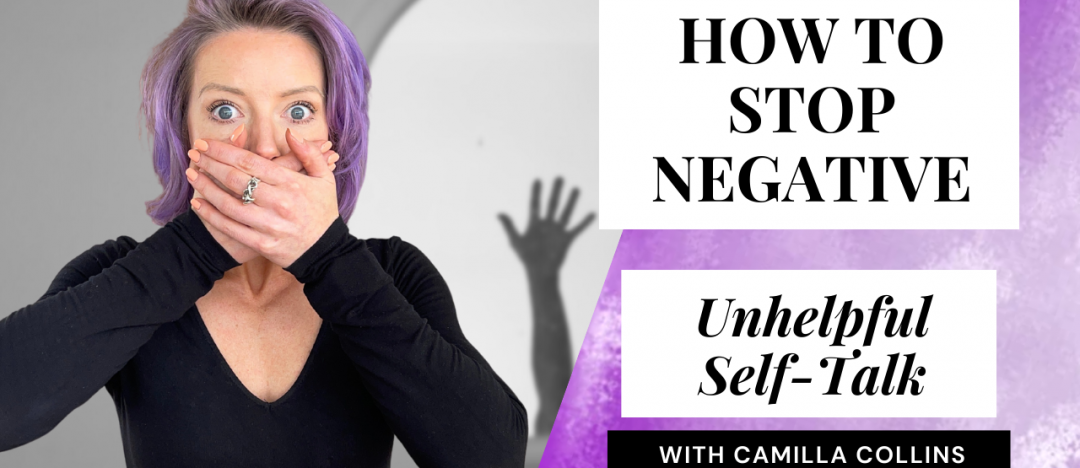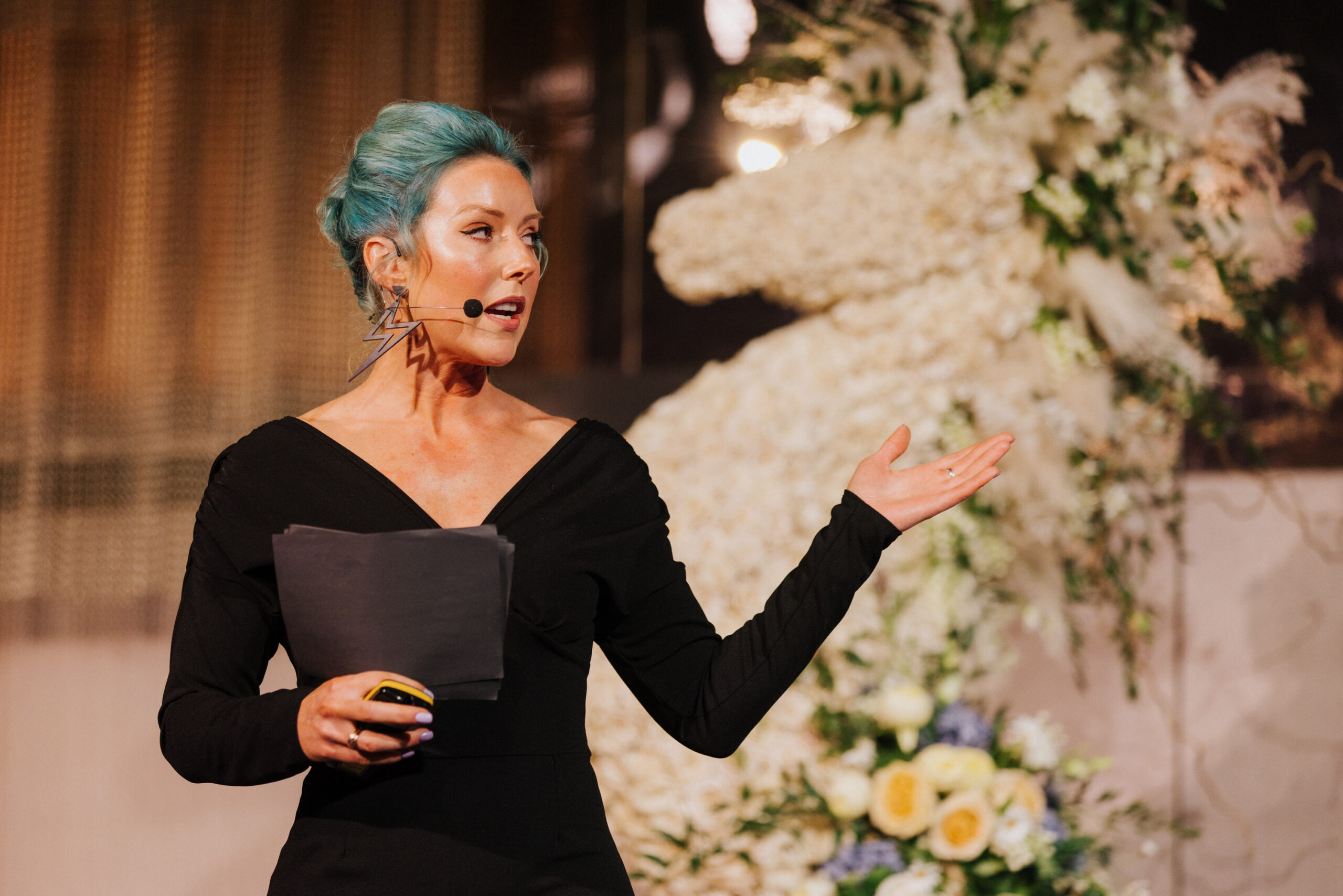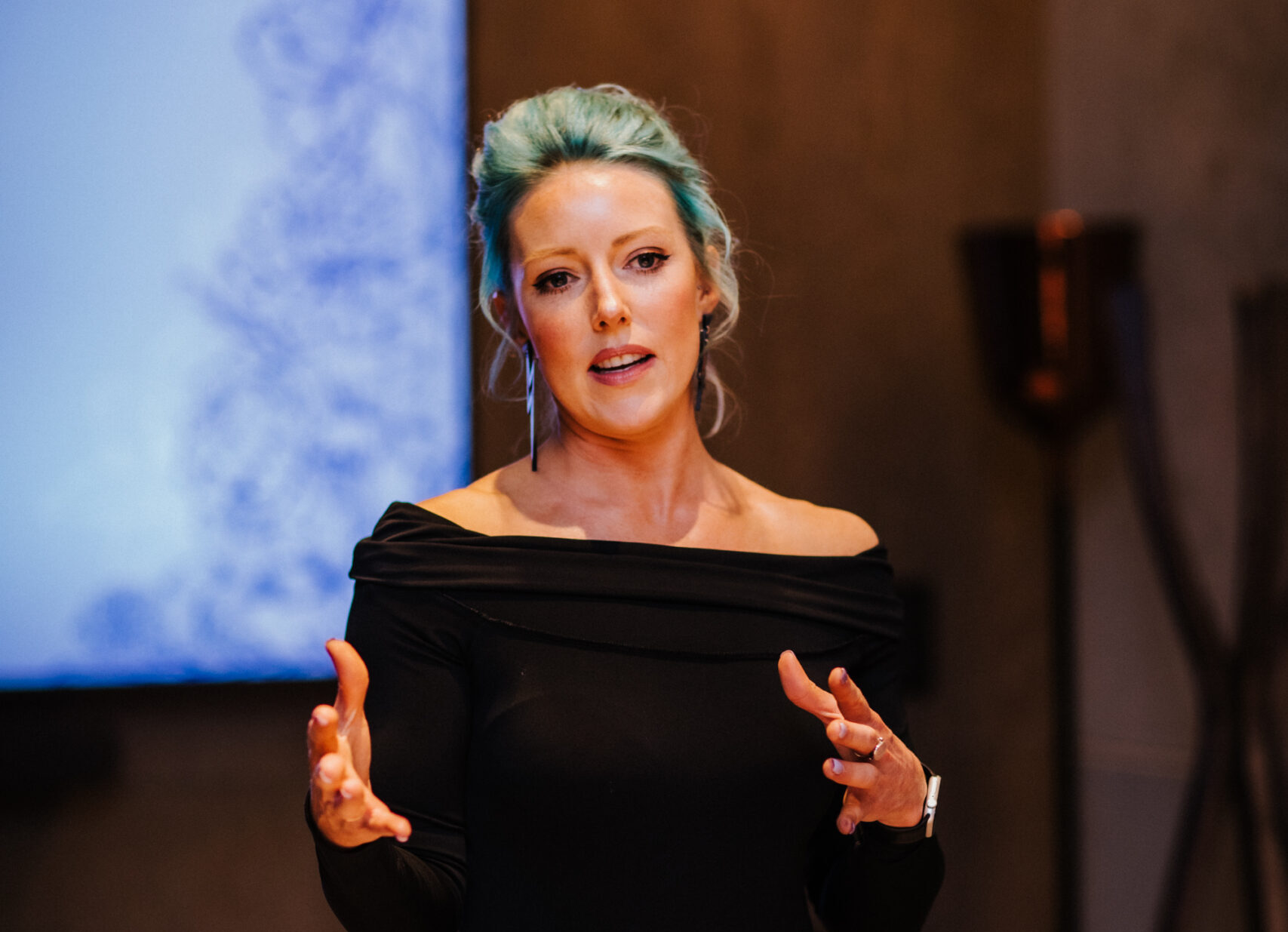We all have a little voice that pipes up inside of our head that can run an extremely unhelpful dialogue. It says things such as:
“You’ll never be able to do it.”
“What would people say?”
“It’s too risky.”
“Who do you think you are?”
…and on it goes!
Now, to some degree, this negative self-talk is trying to keep you safe.
But most of the time it is unwarranted, and it’s a very unhelpful habit.
But before I dive into some ways in which you can stop it, let’s first talk about how – and also why – negative self-talk is “keeping you safe.”
If we go waaayyy back to the caveman days – Over emphasising negative events enabled our ancestors to stay alive – and survive!
A caveman might live an anxious life by staying alert, worrying that every noise outside the cave could be a predator,
but an alert caveman will live longer than a caveman that assumes that every noise means nothing.
Yes, the optimistic caveman might be right some of the time, but if they’re wrong just once… then they’re dead.
Nowadays being wrong is nowhere near as deadly, but the logic isn’t flawed here…
because negative events have a greater potential in damaging you than positive events have in helping you.
And so it can sometimes feel safer to stay where you are rather than move forward.
But I’m sure like me, you have experienced the pain of feeling stuck.
Because there is so much more going on in our current world than there was back in the caveman days, and watching everybody else advance and gain in life can make us feel like we’re falling behind.
It can make us feel separate from others and isolated.
It can bring about feelings of unworthiness.
And the longer we stay still, the more we lose our self-confidence and belief in our abilities, as we strengthen a negative self-image of ourselves and anchor in unhelpful beliefs.
The desire to move away from pain will be stronger than moving towards pleasure in most cases.
And so we are more likely to make decisions based on not wanting to achieve something bad rather than wanting to achieve something good.
And this is where learning how to relink your pain, pleasure, and perception helps.
I go into this in detail in the 3 Ps chapter of my book but for now, let’s focus on what you can start doing today to combat your negative self-talk.
Our negativity bias has developed over some 3 and a half billion years so we’re not going to get rid of it altogether
BUT
we can manage it!
And we can work against it.
And research shows that we can actually physically change our brain to minimise negativity bias. So it’s an actual thing and it can be done!
Negativity bias is really negativity attention bias.
We focus our attention on the negative and we favour consuming negative information or experiences or perceptions at the exclusion of positive information.
And so when we are focused on the negative we completely miss the positive, we don’t even see it or notice it.
So with this in mind, here are 5 things that you can do to combat your negativity bias.
Firstly:
Be aware of the negativity bias. And I think we’ve just covered that one.
So remember that it’s there, there’s not anything wrong with you, we all have it, and you can manage it.
I have a framed quote on my wall that I wake up to every morning (I actually bought it for a friend for christmas a few years ago but I loved it so much that I thought “I’m actually keeping this!”) it’s by A. A. Milne and it says:
“you are braver than you believe, stronger than you seem, and smarter than you think”
It’s been my mantra for a while now, and I use it all the time to remind myself not to fall apart over trivial things that my mind is blowing way out of proportion, or sending me down a negative thought pattern with. Because it tries to do that a lot!
So, find yourself a mantra that works for you, or you can borrow that one, and stick it somewhere where you’ll see it, and can read it often.
Next up is practicing gratitude:
Yes, when I first heard about this I thought it sounded far too wow woo for my liking, and well, just silly, really.
But my goodness did not only trying it, but persevering with it, completely turn my outlook around and transform my days!
I don’t have to do this obsessively every morning now because immediately thinking of things I am grateful for in my life when I’m feeling low is now an automated response, and an extremely valuable tool in my mental health tool kit!
But when starting out I wrote in my journal every morning 5 things that I was grateful for.
I tried to make them different each time to encourage my brain to seek out more positives and I did this every morning immediately when I woke up for a month.
Now I don’t need to write them down I can just think of them when I open my eyes but as I always say writing things down really helps to realise them – which is why journaling is a great tool for making positive changes and processing thoughts reasonably.
Focusing on positives every day will retrain your brain to focus away from negativity and lack. Trust me it works, and I was super skeptical of this at the beginning.
The more deliberately you think about positive things then the more you retrain your attention to look for more of that kind of information.
And remember what I said about negativity bias being more negativity attention bias. Practicing gratitude with positive thinking REALLY helps to combat it.
Thirdly you can use distraction:
Now, I don’t normally encourage distraction because constantly distracting myself from my true feelings doesn’t allow me to accept and process them which means they just fester under the surface and eventually come back again.
However! When used with awareness, distraction can be a great tool to place a bit of space between you and the negative thought or feeling.
This then gives you a window to change your perspective while you are separated from it.
For example, going out for a walk to shake off some negative vibes or feelings can alter my state and distract me, and if I’m just using that walk as an escape, then when I return, the same negative vibe will return again.
But if while I’m out walking, I use the new surroundings and change of physical state to work WITH the negative thoughts or feelings then I can change my perspective on it.
So I’m not ignoring it hoping it’ll go away, I’m placing myself in a new environment to deal with it in a new way because sitting at home, or in the office, wasn’t doing it for me!
And so this is how I can create space to change my perception on things.
Next, remember to take time out to reinforce any good feelings you have of a situation or event:
Don’t wash over good feelings, recognise and solidify them within you.
Even if it’s a mild situation, stay with it as long as possible and really feel the sensations in your body. Again, this may sound a little woo woo, but doing so reshapes your brain.
I’m always harping on about how busy and distracting the world is because it is if you compare it to caveman days!
But when I take an intentional moment to pause, it really grounds me.
It helps with my perspective, and it helps with my anxiety levels on the whole.
I’ve been extremely guilty of brushing over good feelings, both small and mighty, as I was eager to get onto the next dopamine hit either with a success or another good vibe, and this meant that nothing was ever enough for me.
Practicing pausing to really instill that good feeling inside has really helped me to feel more positive about everything as a whole and feel far more confident and stronger to tackle whatever comes up each day.
And finally, number 5 is BE CONSISTENT:
Be consistent with all of this.
Like the gratitude journaling, it took me 30 days of consistency with it to embed that change, and I still have to work at it regularly otherwise my default negativity attention bias will start to take over.
While I personally don’t sit and meditate in the conventional sense, I make sure I take time out every day to reflect and process things and hold onto good feelings when they come up. And my consistent work on my self-awareness ensures that I use things, like distractions, as tools to help me and not hinder me.
If you’ve found this useful and have learned some new ways to keep negative self-talk at bay then check out my YouTube channel or follow me on Instagram for more teachings in the self-image, confidence, and lifestyle department!





